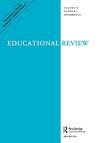从系统外围看未来:低能力分组和教育期望
IF 3.4
3区 教育学
Q1 EDUCATION & EDUCATIONAL RESEARCH
引用次数: 2
摘要
现有研究发现,教育期望是可塑的,并随着教育投入(如教育分层水平中的位置)的变化而调整。通过考察西班牙综合教育体系(低能力分组课程)中引入的两种不同形式的课程差异,我研究了两个学习成绩相同的15岁学生,如果其中一个被转入这些课程,他们的教育期望是否会有所不同。我使用2018年PISA数据库和熵平衡来平衡变量的分布,这些变量混淆了低能力分组与期望之间的关系。结果表明,转入低能力群体对高中和大学教育的纵向和横向期望都有实质性影响。基于一般课程简化的课程主要限制横向期望(学术与职业教育),而职业前课程也缩短了参与者的教育计划。因此,与学生的教育地位相关的影响并不排斥高度分层的系统和其他形式的课程差异,否则高度综合的系统可以影响教育期望的重新配置。本文章由计算机程序翻译,如有差异,请以英文原文为准。
Looking at the future from the periphery of the system: low-ability grouping and educational expectations
ABSTRACT Extant research has observed that educational expectations are malleable and adjust in response to educational inputs such as the position in a stratified level of education. Examining two distinct forms of curricular differentiation introduced in the comprehensive Spanish educational system (low-ability grouping programmes), I study whether two identical 15-year-old students with the same academic performance would differ in their educational expectations if one of them was diverted into these programmes. I use the 2018 PISA database and Entropy Balancing to balance the distribution of variables that confound the relationship between low-ability grouping and expectations. Results indicate that being diverted into a low-ability group exerts a substantial effect on the vertical and horizontal expectations about Upper Secondary and Tertiary Education. Programmes based on a simplification of the general curriculum mainly condition horizontal expectations (academic vs vocational education), while pre-vocational programmes also shorten the educational plans of participants. Therefore, the effects associated with the educational position of the student are not exclusive of highly stratified systems and other forms of curricular differentiation in otherwise highly comprehensive systems can be influential in the reconfiguration of educational expectations.
求助全文
通过发布文献求助,成功后即可免费获取论文全文。
去求助
来源期刊

Educational Review
EDUCATION & EDUCATIONAL RESEARCH-
CiteScore
7.90
自引率
3.00%
发文量
105
期刊介绍:
Educational Review is a leading journal for generic educational research and scholarship. For over seventy years it has offered scholarly analyses of global issues in all phases of education, formal and informal. It publishes peer-reviewed papers from international contributors across a range of education fields and or perspectives including pedagogy and the curriculum, history, philosophy, psychology, sociology, international and comparative education and educational leadership. Articles offer original insights to formal and informal educational policy, provision, processes and practice and the experiences of all those involved in many countries around the world. The editors welcome high quality, original papers which encourage and enhance debate on social justice and critical enquiry in education, besides innovative new theoretical and methodological scholarship. The journal offers six editions a year. The Board invites proposals for special editions as well as commissioning them.
 求助内容:
求助内容: 应助结果提醒方式:
应助结果提醒方式:


